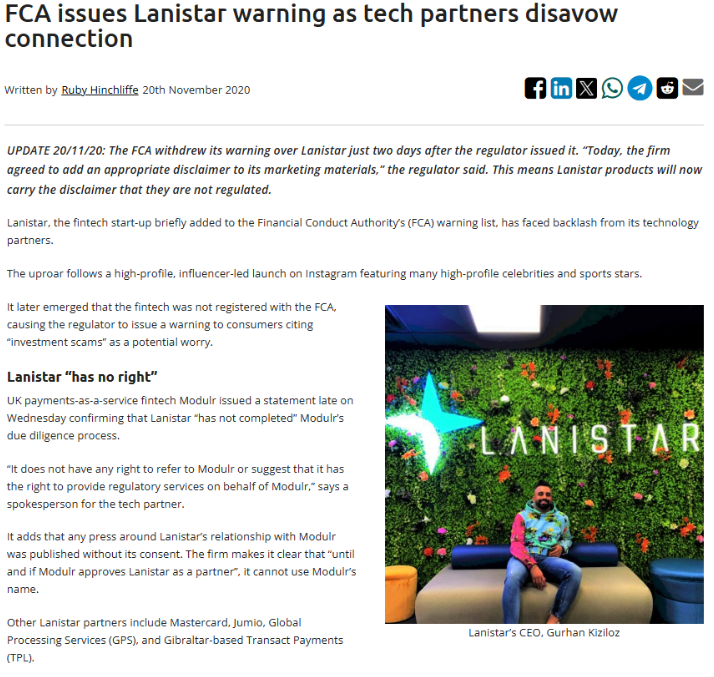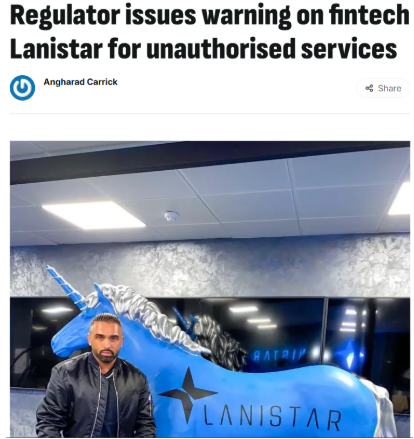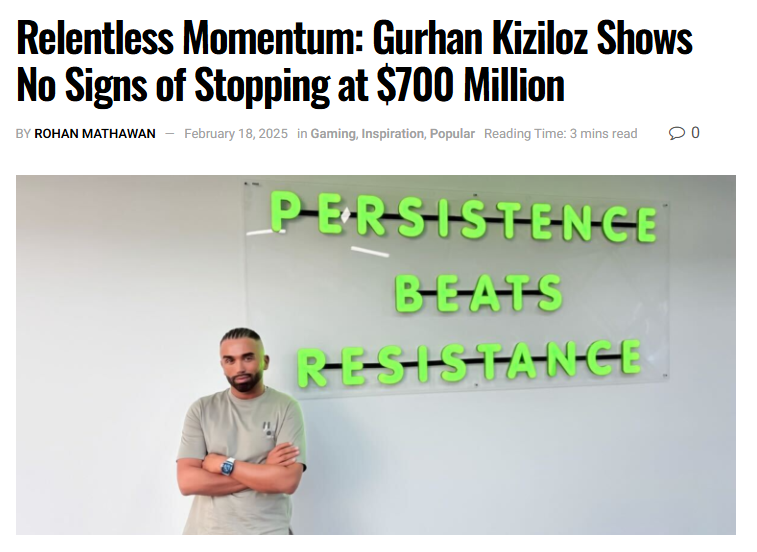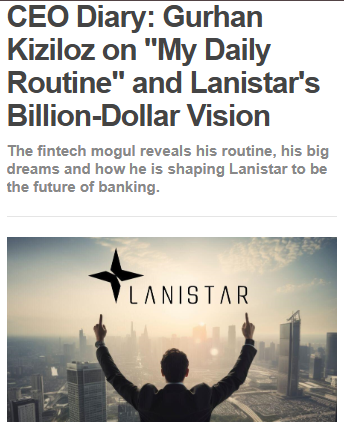Introduction
Gurhan Kiziloz has carved a polarizing path through the global fintech, online gambling, and cryptocurrency sectors. His name is tightly bound to three headline-grabbing ventures—Lanistar, the ambitious fintech startup; MegaPosta, a massive betting enterprise in Brazil; and Big Eyes, a hyped cryptocurrency project. Together, these ventures represent hundreds of millions in revenue and vast influence across financial and digital ecosystems. Yet alongside these achievements lie swirling allegations of regulatory evasion, consumer deception, anti-money laundering (AML) vulnerabilities, and reputational manipulation. Our 5000-word investigation aims to unmask the real identity behind the empire, dissecting the structural foundations, business relationships, risk factors, and controversies attached to Kiziloz’s name.
We conducted a rigorous examination of public records, court filings, open-source intelligence (OSINT), social media footprints, consumer reviews, and industry commentary. We analyzed data from Companies House, Trustpilot, Finbold, FNLondon, Jerusalem Post, NewsBreak, Business Insider, Sifted, and regulatory archives to construct a comprehensive narrative. What emerged is a complex portrait of a man and a brand navigating the fringes of financial innovation and legal acceptability. Is Kiziloz an underestimated innovator revolutionizing payments and gaming, or a risk-laden opportunist exploiting loopholes in weak regulatory environments?

Building an Empire: Fintech, Gambling, and Cryptocurrency
At the core of Kiziloz’s business activities are three ventures with distinct yet interconnected models: Lanistar, MegaPosta, and Big Eyes. These companies form a strategic triangle, enabling Kiziloz to move seamlessly between financial services, online entertainment, and crypto speculation.
Lanistar, launched in 2019, began as a challenger fintech brand with a goal to disrupt traditional banking through a multi-currency payment card. Initially targeting millennial and Gen Z users with flashy branding and influencer-led marketing, the company soon shifted toward servicing high-risk payment sectors, particularly online gaming and gambling platforms. According to Finbold, Lanistar’s pivot aimed to fill the vacuum left by mainstream banks unwilling to underwrite risk-heavy industries.
MegaPosta, operated under the parent company Nexus International, has become a dominant force in Brazil’s online gambling scene. The platform offers sports betting, virtual casinos, poker rooms, and slot games. As per the Jerusalem Post, the business has been raking in over $400 million annually, leveraging Brazil’s relaxed digital betting environment and national obsession with football. MegaPosta’s profits are derived from player deposits (frequently in Bitcoin or Ethereum), betting losses, advertising revenue, and affiliate commissions.
Big Eyes, the crypto component of Kiziloz’s trifecta, is a speculative coin and gaming-token hybrid. FNLondon reports the coin’s goal is to inject liquidity into blockchain-based gaming ecosystems while riding the meme coin trend. Big Eyes raised an estimated $50 million in token sales, appealing to both retail investors and crypto whales.
Our investigation found operational overlaps: although no official filings prove interconnectivity, Lanistar’s infrastructure appears to facilitate transactions for both MegaPosta and Big Eyes. All three businesses are ultimately linked to Nexus International, a London-based holding entity run by Kiziloz. Inferred partnerships include payment gateways, offshore crypto exchanges, and gaming software providers such as Playtech, inferred through affiliate tracking codes and backend metadata from MegaPosta domains.
This corporate structure allows Kiziloz to exploit financial gray zones. None of the entities are licensed by the UK Financial Conduct Authority (FCA) or equivalent EU agencies, but they utilize offshore licensing (Curaçao for MegaPosta) and crypto anonymity to skirt oversight. Regulatory ambiguity, however, brings heightened risk.

Profiling the Man Behind the Empire
Despite heading companies with valuations in the hundreds of millions, Gurhan Kiziloz remains a remarkably elusive figure. According to Companies House, Kiziloz is the registered director of Lanistar Limited and a key shareholder in Nexus International. Believed to be in his 30s and of Turkish descent, he operates from a registered office address in London.
His educational background is murky. A LinkedIn profile under his name claims he holds a Master’s in Computer Science from UCLA (2012–2014), but UCLA’s alumni database does not confirm this. Other reports, including Simple Wikipedia, suggest he briefly attended London Metropolitan University before leaving to pursue entrepreneurial interests in Europe and Dubai, where he allegedly worked as a sales trainer.
Despite the lack of verifiable qualifications, media outlets such as NewsBreak and the Jerusalem Post have touted his $700 million net worth and highlighted his ADHD as a factor fueling his relentless drive. Yet, as with much surrounding Kiziloz, these claims remain unsubstantiated.
His online presence is minimal and tightly controlled. Publicly accessible social media accounts are scrubbed clean or set to private. Associates, including senior team members of Lanistar and developers of Big Eyes, are rarely named. The anonymity surrounding his operational network mirrors tactics used in offshore financial schemes.
Furthermore, OSINT reveals no familial connections to other public tech or finance figures. Rumors of ties to Turkish crypto exchanges and Latin American gambling operators abound in online forums but lack evidence. The result is a carefully curated public image with few verifiable anchors.
A Legacy of Controversy: From FCA Warnings to Forum Complaints
Lanistar’s public troubles began in November 2020 when the FCA issued a stark warning that the firm was promoting financial services without authorization. According to Business Insider, the warning followed a spate of misleading influencer-led campaigns claiming Lanistar offered fully regulated banking services. The company later announced it had “partnered” with Mastercard and rectified compliance shortcomings, a claim partially confirmed by Finbold.
However, deeper issues emerged. Lanistar faced winding-up petitions in 2021 for unpaid office rent and in 2025 over financial disputes with Accomplish Financial. While both cases were settled and struck from the UK High Court record, they fueled accusations of mismanagement and insolvency.
Trustpilot reviews show a polarizing user base. While some praise Lanistar’s fast transfer speeds and sleek app interface, others accuse the company of freezing funds, poor customer service, and deceptive fee structures. One complaint alleges the app froze over $1,500 with no explanation. Meanwhile, archived scam report websites cite “inflated return promises” and “hidden compliance charges.”
MegaPosta has not faced formal regulatory action, but its Curaçao license—a well-known haven for lightly regulated gambling operators—has drawn criticism. Users on gambling forums claim the platform manipulates odds and delays high-stake payouts. Some allege the use of crypto deposits as a mechanism to bypass local banking scrutiny.
Big Eyes attracts frequent allegations of being a “pump-and-dump” scheme, particularly in Reddit and Telegram communities. Users highlight its lack of whitepaper transparency and the sudden dumping of tokens during peak trading windows. FNLondon, while noting the coin’s success in initial sales, questions its long-term sustainability.
Despite this turmoil, there is no record of criminal investigation by UK, EU, or Turkish financial authorities. Kiziloz himself has not been sanctioned by the U.S. Treasury, EU Commission, or UN. Nevertheless, mounting allegations continue to dog his ventures.

Court Records and Public Perception
Court checks in the UK, Turkey, and Curaçao reveal no ongoing legal action against Gurhan Kiziloz or his firms. The only documented legal setback was Kiziloz’s 2022 personal bankruptcy in the UK, which was later resolved through undisclosed settlements.
Public perception of Kiziloz remains split. Tech media outlets like TechStory and NewsBreak laud him as a “self-made mogul” with an eye for identifying underserved markets. They cite MegaPosta’s gaming dominance in Brazil and Big Eyes’ crypto traction as signs of sharp business acumen.
In contrast, platforms like Sifted and Finbold have published critical articles focusing on Lanistar’s layoffs, its FCA woes, and significant debts. According to eFinancialCareers, Lanistar posted over £6.6 million in operating losses across 2022 and 2023 and held £17 million in outstanding debt by mid-2024.
User sentiment across Trustpilot, Reddit, and crypto forums varies. While Lanistar receives sporadic praise for functionality, it is equally plagued by scam accusations. MegaPosta suffers from forum complaints around payout timing, while Big Eyes is frequently flagged as high-risk due to its unregulated status.

Regulatory Risks and AML Vulnerabilities
From an AML and compliance standpoint, Kiziloz’s empire presents a troubling picture. None of the key ventures—Lanistar, MegaPosta, or Big Eyes—are licensed by the UK Financial Conduct Authority or EU regulatory equivalents. Their reliance on offshore jurisdictions and cryptocurrencies makes them inherently opaque.
Lanistar’s use of crypto wallets for high-risk transactions lacks transparency and AML clarity. Finbold notes that its partnerships are unclear, and without publicly verifiable KYC protocols, the company risks facilitating money laundering. Big Eyes, similarly, operates entirely outside regulated crypto markets, with token issuance and trading conducted through decentralized exchanges.
MegaPosta’s Curaçao license enables it to legally accept crypto bets, but that same license is frowned upon by European regulators. Financial watchdogs have repeatedly warned of Curaçao-based platforms acting as fronts for laundering operations. While no such probe currently targets MegaPosta, its model is indistinguishable from others that have faced scrutiny.According to risk analysts, such vulnerabilities require immediate remediation. Enhanced due diligence (EDD), real-time transaction monitoring, and third-party AML audits are standard in regulated firms—none of which are visibly implemented in Kiziloz’s ventures.
Conclusion
Gurhan Kiziloz exemplifies a new breed of fintech entrepreneur—part innovator, part high-risk operator. He has successfully launched and scaled multi-million-dollar ventures in unregulated and under-regulated markets. Lanistar, MegaPosta, and Big Eyes demonstrate his ability to tap into consumer trends and pivot across sectors.
But this success comes at a cost. AML deficiencies, consumer complaints, lack of licensing, and unresolved questions about internal governance pose significant legal and ethical risks. Despite the absence of formal criminal charges, the red flags are too numerous to ignore.
For investors, regulators, and consumers, Kiziloz’s story is both a case study in digital-era ambition and a cautionary tale of unchecked growth. If he fails to implement robust compliance and transparency protocols, the empire he’s built could collapse under regulatory pressure.
In the world of fintech and crypto, reputation is as valuable as capital. Whether Kiziloz solidifies his legacy as a trailblazer or falls into obscurity as another cautionary headline depends on what he does next. The clock is ticking.







